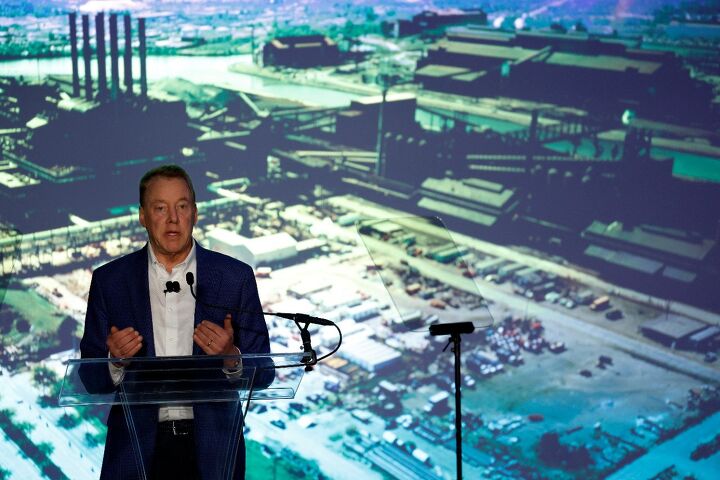Ford Executive Chair Bill Ford Asks UAW to End Strike

Ford Motor Company Executive Chairman Bill Ford has asked union members to come together and end the UAW strike before it hampers the business’ ability to invest in future products and facilities.
While it’s relatively uncommon to see top-ranking automotive executives discuss contract negotiations in the midst of a strike, the UAW has taken a decidedly more aggressive approach this time around and General Motors CEO Mary Barra has also made some public comments on the matter. Ford’s tactic seems to be split between hoping to evoke some public sympathy and having leadership issue veiled threats about future employment opportunities.
“It’s the absolute lifeblood of our company. And if we lose it, we will lose to the competition. America loses. Many jobs will be lost,” Henry Ford’s great-grandson was quoted as saying by the Associated Press.
Though layoffs and reduced spending are probably a given for any company that’s taking a severe financial hit. Regardless of how we got here, Ford still has to deal with the realities of the situation and you cannot pay for things with money you don’t have unless you’re the government or a bank — for reasons that have never been satisfactorily explained to me.
From AP:
The company, he said, builds more vehicles in America and has more United Auto Workers employees than any company, which has increased its costs in a highly competitive industry.
Ford has 57,000 UAW workers compared with 46,000 at GM and 43,000 at Stellantis. “Many of our competitors moved jobs to Mexico as we added jobs here in the U.S.,” [Chairman] Ford said.
The company is near an impasse with the United Auto Workers union, which walked out in targeted strikes at all three Detroit automakers on Sept. 15.
Last week 8,700 union members walked out at the largest and most profitable Ford plant in the world, the Kentucky Truck Plant in Louisville.
Ford said the strike at the Kentucky plant is harming tens of thousands of Americans who work for parts suppliers and Ford dealers. The strike also could cause a fragile parts supply base to collapse, he said. “If it continues, it will have a major impact on the American economy and devastate local communities,” he said.
“We need to come together to bring an end to this acrimonious round of talks,” Mr. Ford continued. “I still believe in a bright future — one that we can build together. I still believe the automobile industry is a major force for good in our country. We will continue to be there when America needs us most.”
Meanwhile, UAW President Shawn Fain has asserted that Ford, General Motors, and Stellantis have enjoyed billions in annual profits without fairly compensating employees. The keystone argument in this year’s aggressive contract negotiations is that UAW members have taken hits and made financial concessions to accommodate automakers through several economic downturns (especially in 2008). But the industry never returned the favor when profitability resumed.
While the automotive sector is indeed raking in billions of dollars as vehicle pricing increases, wage stagnation is something that’s been a part of the American economy since the 1970s. For decades, the status quo has involved increased pay for top-level executives while average employees didn’t even see their incomes matching inflation. In 1965, the typical CEO made 21 times the salary of the average person employed by their company. But, according to the Economic Policy Institute, the difference has pitched up to nearly 400 times in recent decades. This represents an unprecedented income disparity with the inflationary spike the United States has endured following the global pandemic response just making things worse.
The UAW is using today’s staggering income disparity as leverage during negotiations by trying to get the public on its side. The wage increases the union is demanding have even been intentionally set to mimic compensation issued to CEOs over the last several years.
"The reason we ask for 40 [percent] pay increases is because, in the last four years alone, the CEO pay went up 40 [percent]," Fain said during the first week of the strike.
However, it’s not as though the future will be eternally bright for automakers. Due to heavy investment costs, Ford’s all-electric arm lost $2.1 billion in 2022 and is projected to lose nearly $4.5 billion by the end of 2023.
While we can place some blame on the manufacturer for allocating so much capital on EVs while criticizing global regulations that have forced the issue before the necessary infrastructure was in place, it seems less fair to place those losses on the backs of factory workers building vehicles Blue Oval leadership has not yet figured out how to make profitable.
However, it’s not just Ford suffering from this phenomenon. With the noteworthy exception of Tesla — which sells loads of carbon credits and is quickly making its charging format the global standard — there really aren’t any companies that have figured out how to make EVs work for their bottom line.
While UAW leadership doesn’t seem petrified by the prospect of EVs leading to fewer or more outsourced assembly jobs, they have asked for employment guarantees as those factories are spun up. But it’s the wages and cost-of-living compensation that has the brunt of union attention and it says no deal yet offered has been satisfactory.
The UAW has confirmed that Ford’s latest general wage offer is up to 23 percent over four years and that it has reinstated cost of living raises. GM and Stellantis are reportedly only offering 20 percent. However, all of the above are less than the union had demanded when the strike began last month.
On Thursday, Kumar Galhotra, president of Ford’s still-profitable combustion vehicle business, told reporters that Ford had difficulty even offering the deal that’s presently on the table.
“We have been very clear we are at the limit,” he said. “We risk the ability to invest in the business and profitably grow. And profitable growth is in the best interest of everybody at Ford.”
In the coming weeks, we’re likely to begin seeing more automakers issuing statements to the media about how a sustained strike will ultimately raise the price of vehicles and endanger domestic jobs. But these were already major issues before a single unionized employee walked off the factory floor last month. Due to a roster of deep-seated problems that should have been dealt with decades ago and some unwise investing having taken place in recent years, the automotive industry has found itself in quite a predicament. But both sides of the fight are poised to lose if no compromises are made.
Those interested in listening to Bill Ford's speech in its entirety can find it here.
[Image: Ford]
Become a TTAC insider. Get the latest news, features, TTAC takes, and everything else that gets to the truth about cars first by subscribing to our newsletter.

A staunch consumer advocate tracking industry trends and regulation. Before joining TTAC, Matt spent a decade working for marketing and research firms based in NYC. Clients included several of the world’s largest automakers, global tire brands, and aftermarket part suppliers. Dissatisfied with the corporate world and resentful of having to wear suits everyday, he pivoted to writing about cars. Since then, that man has become an ardent supporter of the right-to-repair movement, been interviewed on the auto industry by national radio broadcasts, driven more rental cars than anyone ever should, participated in amateur rallying events, and received the requisite minimum training as sanctioned by the SCCA. Handy with a wrench, Matt grew up surrounded by Detroit auto workers and managed to get a pizza delivery job before he was legally eligible. He later found himself driving box trucks through Manhattan, guaranteeing future sympathy for actual truckers. He continues to conduct research pertaining to the automotive sector as an independent contractor and has since moved back to his native Michigan, closer to where the cars are born. A contrarian, Matt claims to prefer understeer — stating that front and all-wheel drive vehicles cater best to his driving style.
More by Matt Posky
Latest Car Reviews
Read moreLatest Product Reviews
Read moreRecent Comments
- Peter Buying an EV from Toyota is like buying a Bible from Donald Trump. Don’t be surprised if some very important parts are left out.
- Sheila I have a 2016 Kia Sorento that just threw a rod out of the engine case. Filed a claim for new engine and was denied…..due to a loop hole that was included in the Class Action Engine Settlement so Hyundai and Kia would be able to deny a large percentage of cars with prematurely failed engines. It’s called the KSDS Improvement Campaign. Ever hear of such a thing? It’s not even a Recall, although they know these engines are very dangerous. As unknowing consumers load themselves and kids in them everyday. Are their any new Class Action Lawsuits that anyone knows of?
- Alan Well, it will take 30 years to fix Nissan up after the Renault Alliance reduced Nissan to a paltry mess.I think Nissan will eventually improve.
- Alan This will be overpriced for what it offers.I think the "Western" auto manufacturers rip off the consumer with the Thai and Chinese made vehicles.A Chinese made Model 3 in Australia is over $70k AUD(for 1995 $45k USD) which is far more expensive than a similar Chinesium EV of equal or better quality and loaded with goodies.Chinese pickups are $20k to $30k cheaper than Thai built pickups from Ford and the Japanese brands. Who's ripping who off?
- Alan Years ago Jack Baruth held a "competition" for a piece from the B&B on the oddest pickup story (or something like that). I think 5 people were awarded the prizes.I never received mine, something about being in Australia. If TTAC is global how do you offer prizes to those overseas or are we omitted on the sly from competing?In the end I lost significant respect for Baruth.


































Comments
Join the conversation
It might be too soon to expect the UAW and the auto manufacturers to sit at a table and do some hard and meaningful negotiations. It might take a couple of months before any serious negotiations take place. Bill Ford might have spoke because of Ford's stockholders and to maintain Ford's stock price but he did not help Ford's cause. Better to shut one's mouth and say nothing than to speak and remove all doubt that you are a fool. Not one of Bills better ideas to broadcast his belief that a strike could jeopardize the existence of Ford. Not the best idea to expose your weaknesses especially when customers who have been waiting months and some for a year for their new Bronco, Maverick, and heavy duty Ford truck. Is it smart to cause panic and have those customers cancel their orders because they could fear buying a vehicle from a company that could fail? It will take a prolonged strike with workers just living on strike benefits and dealer's with less stock of more popular selling vehicles made by the UAW to bring any serious negotiations. 20% pay raise offered by Ford and the 40 percent increase sought by the UAW are still far apart. A negotiated settlement could be to split the difference and offer the increase over a number of years like 5 years and then COLA increases.
Ford, GM and what's left of Dodge/Ram/Chrysler/Jeep are all dead companies walking. Tesla has already proven to be the only really good EV manufacturer and the geopolitical rulers have already sentenced the world to an EV future. Eventually ICE powertrains will be illegal to produce. If the big 2.5 survive to see that day it will only be with more Billions in stolen tax dollars. As for the foreign manufactures, maybe Toyota lives on, the Koreans maybe, the Europeans will survive with subsidies or not at all.